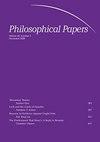从别人的盲目中看到自己:从普鲁斯特的《追忆似水年华》中的文学中学习
IF 1.3
3区 哲学
0 PHILOSOPHY
引用次数: 0
摘要
在文学中认识自己不仅可以帮助你更清楚地把握自己的想法和感受。它也会深深扰乱你对自己的看法。这篇文章探讨了迄今为止被忽视的机制:通过在别人的盲目中看到自己来学习。我认为《追忆似水年华》是这种现象的缩影。面对那些对衰老浑然不觉的人物,让主人公意识到自己也在不知不觉中变老了,并邀请读者产生类似的见解。这篇论文有助于讨论如何从文学中学习,并对马塞尔·普鲁斯特(Marcel Proust)关于文学的目的是让读者在文学中认识自己的说法进行了曲解。本文章由计算机程序翻译,如有差异,请以英文原文为准。
Seeing Yourself in Others’ Blindness: Learning from Literature as Epitomized in Proust’s In Search of Lost Time
Abstract Recognizing yourself in literature can not only help you to get a clearer grasp of what you already think and feel. It can also deeply unsettle your vision of yourself. This article examines a hitherto neglected mechanism to this effect: learning by way of seeing yourself in others’ blindness. I show that In Search of Lost Time epitomizes this phenomenon. Confronting characters oblivious to their old age makes the protagonist realize that he, too, has aged without noticing it, and invites readers to analogous insights. The paper contributes to the discussion on how you can learn from literature and adds a twist to Marcel Proust’s claim that the purpose of literature is that readers recognize themselves in it.
求助全文
通过发布文献求助,成功后即可免费获取论文全文。
去求助
来源期刊

Philosophical Papers
PHILOSOPHY-
CiteScore
2.10
自引率
0.00%
发文量
18
期刊介绍:
Philosophical Papers is an international, generalist journal of philosophy edited in South Africa Original Articles: Articles appearing in regular issues are original, high-quality, and stand-alone, and are written for the general professional philosopher. Submissions are welcome in any area of philosophy and undergo a process of peer review based on initial editor screening and refereeing by (usually) two referees. Special Issues: Topic-based special issues are comprised of both invited and submitted papers selected by guest editors. Recent special issues have included ''Philosophy''s Therapeutic Potential'' (2014, editor Dylan Futter); ''Aging and the Elderly'' (2012, editors Tom Martin and Samantha Vice); ''The Problem of the Criterion'' (2011, editor Mark Nelson); ''Retributive Emotions'' (2010, editor Lucy Allais); ‘Rape and its Meaning/s’ (2009, editor Louise du Toit). Calls for papers for upcoming special issues can be found here. Ideas for future special issues are welcome.
 求助内容:
求助内容: 应助结果提醒方式:
应助结果提醒方式:


